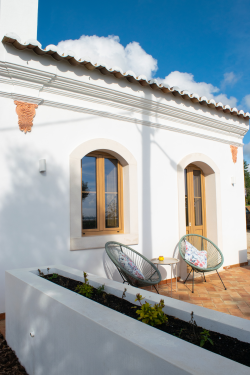
The weather
--- **The Algarve: A Year-Round Destination** The Algarve, one of Europe's most beloved holiday destinations, offers a unique climate and cultural experience throughout the year. Whether you're planning a summer getaway or a winter escape, this region has something special to offer in every season. Let’s explore what each month brings to the Algarve. --- ### January: A Serene Start After the festive hustle of December, January brings a sense of tranquility to the Algarve. The days are shorter but still longer than in many parts of Europe, providing ample daylight for outdoor activities. Temperatures are mild, making it perfect for long walks on the beach or exploring the countryside without the summer crowds. --- ### February: Romantic Escapes February is a romantic month, ideal for couples looking to escape the winter chill elsewhere. The weather is pleasant, with occasional rain showers that add a cozy touch to indoor activities like visiting local museums or enjoying a leisurely meal at one of the many charming restaurants. --- ### March: Spring Awakening As spring approaches, March sees the Algarve coming back to life. The weather is warmer, and nature begins to bloom. It's an excellent time for outdoor activities like hiking, cycling, or simply enjoying the beautiful landscapes. The beaches are less crowded, offering a peaceful retreat. --- ### April: Easter Celebrations April is marked by Easter celebrations, which bring vibrant festivities to the region. The weather is typically sunny and warm, perfect for beach days or exploring historical sites. Local markets and fairs add to the lively atmosphere, making it a great time to immerse yourself in Portuguese culture. --- ### May: Pre-Summer Bliss May offers a preview of summer with its warm temperatures and long days. It's an ideal month for those who want to enjoy the beach without the peak season crowds. The sea is warming up, making it perfect for swimming and water sports. --- ### June: Summer Kick-Off June marks the official start of summer in the Algarve. The days are long and sunny, with temperatures rising steadily. It's a popular month for families and couples alike, offering a mix of relaxation and adventure. Festivals and events begin to fill the calendar, adding excitement to the summer vibe. --- ### July: Peak Summer Fun July is one of the busiest months in the Algarve, with tourists flocking to enjoy the sunny beaches and vibrant nightlife. The weather is hot and dry, perfect for beach days, water sports, and outdoor dining. Festivals and cultural events are in full swing, offering a rich tapestry of experiences. --- ### August: Family Holidays August continues the summer fun with many families taking their annual holidays. The beaches are bustling, and local festivals add a touch of Portuguese flavor to the vacation experience. It's a great time for family activities, from beach days to exploring historical sites. --- ### September: Golden Days September is often considered one of the best months to visit the Algarve. The weather is still warm, but the crowds have thinned out, making it a more relaxed experience. The sea remains invitingly warm, and the evenings are balmy, perfect for outdoor dining and leisurely strolls. --- ### October: Autumn Charm October brings a mix of sunny days and occasional rain showers, but the weather is generally pleasant. It's a great time to enjoy the outdoors without the summer heat. Local festivals and events continue, offering a rich cultural experience. The evenings are cooler, making it cozy for indoor activities. --- ### November: Mild Winter Days November is often overlooked but offers mild weather and fewer tourists. It's an ideal time for those who enjoy quieter holidays. The days are shorter, but the sun still shines brightly, making outdoor activities enjoyable. Local markets and fairs add to the charm of the season. --- ### December: Festive Cheer December is a festive month in the Algarve, with Christmas decorations lighting up the streets and towns. The weather is cooler but still mild compared to many parts of Europe. Local traditions and celebrations make it a special time to visit, offering a unique blend of Portuguese culture and holiday cheer. --- ### Faro: A Unique Climate Faro, the district capital of the Algarve, often serves as a reference point for weather forecasts. However, its location on an outcrop of the Atlantic Ocean means it has a slightly different climate compared to other parts of the region. Outside Faro, the days are generally warmer and sunnier, while evenings can be cooler. --- ### Beyond the Algarve: Exploring Portugal While the Algarve enjoys a unique microclimate due to its southern location behind a mountain range, the rest of Portugal offers diverse weather conditions. The interior can be cold in winter and scorching hot in summer, while the northern coast experiences cool winds even in spring and autumn. Lisbon sees similar rainfall to Amsterdam but with fewer rainy days. Each region has its charm and is worth exploring for different reasons. --- This adapted article about the weather in the Algarve was written by Cees Groenewegen, known for his delightful book "Portugal stukje bij beetje," a must-read! The photos were taken and incorporated into his text to enhance your visual experience of this beautiful region.This is our own website with the best price. Click here for our accommodations or ask us your question. Or read on with Reviews of the Boutique Hotel Guesthouse-Moncarapacho in the East Algarve, Portugal! , Fishing village of Fuseta or go to the overview of all articles.
